Project Management: Analyzing Team Dynamics and Reflective Practice
VerifiedAdded on 2022/08/14
|6
|1515
|24
Report
AI Summary
This report delves into the intricacies of project management, focusing on team dynamics, reflective practice, and individual contributions. The student begins by outlining the application of Tuckman’s stages of team development and the creation of team hierarchies, highlighting the importance of understanding roles and responsibilities. The report emphasizes the use of Belbin’s team role model, with the student identifying as a team worker and prioritizing mutual understanding and flexibility. The analysis extends to addressing challenges like resource inadequacies, where interactive meetings and training sessions, informed by Gibbs Reflective Cycle, were crucial for developing action plans and problem-solving strategies. The report also discusses the use of self-organizational skills, alternative means of resource acquisition, and the importance of post-training assessments and personality tests. The student concludes by emphasizing the significance of consistent evaluation and alternative analysis for refining future action plans and enhancing critical thinking skills.
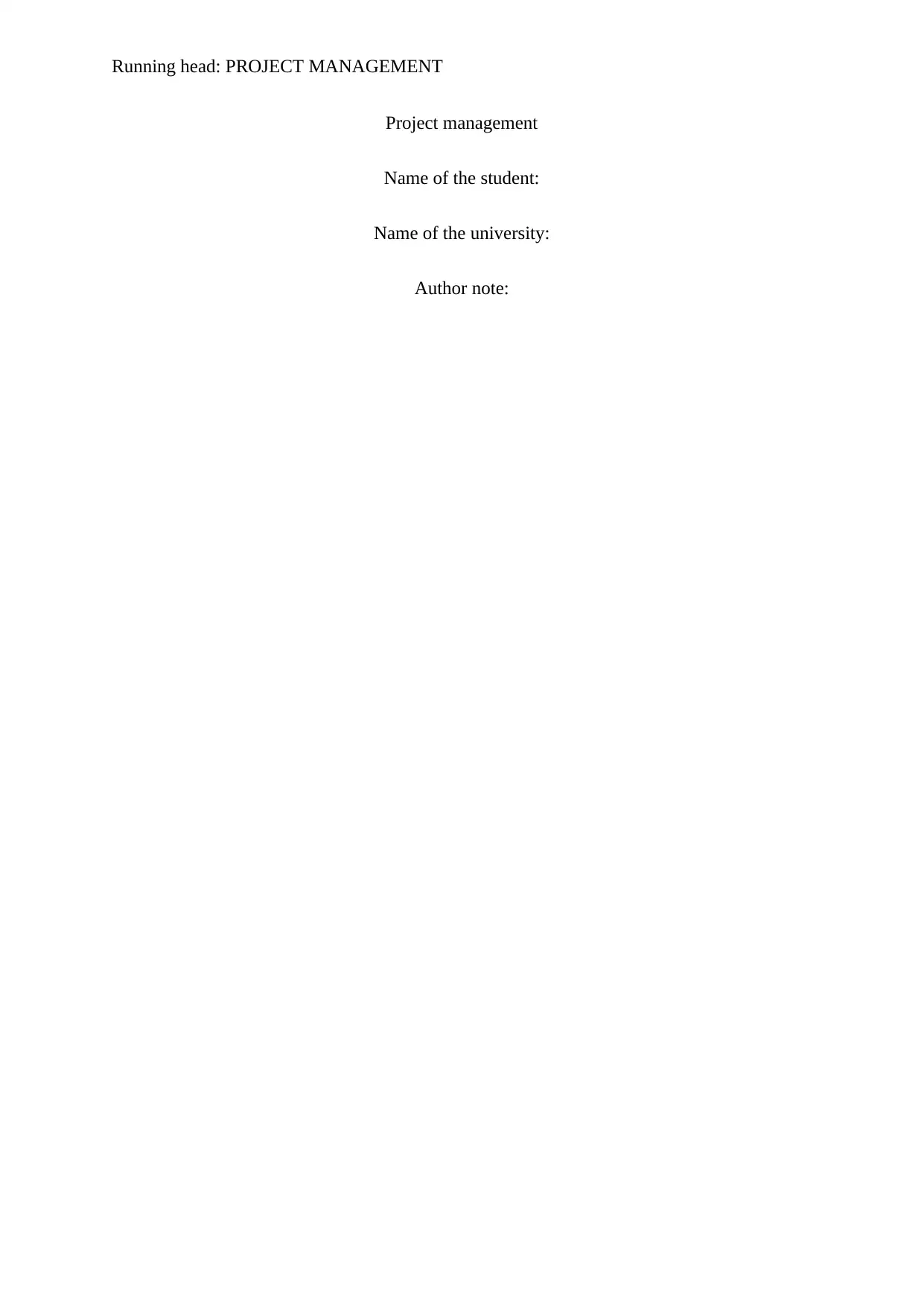
Running head: PROJECT MANAGEMENT
Project management
Name of the student:
Name of the university:
Author note:
Project management
Name of the student:
Name of the university:
Author note:
Paraphrase This Document
Need a fresh take? Get an instant paraphrase of this document with our AI Paraphraser
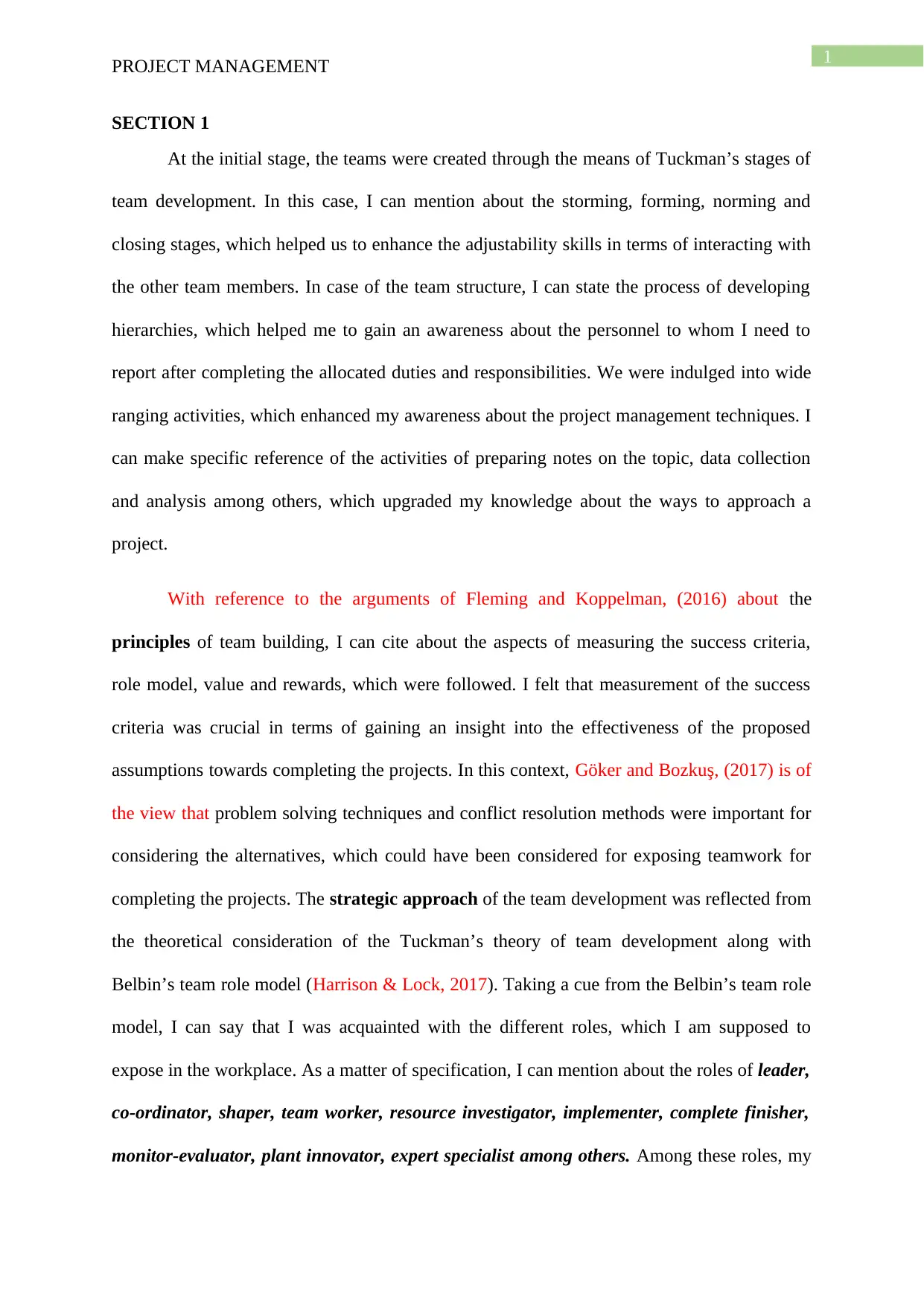
1
PROJECT MANAGEMENT
SECTION 1
At the initial stage, the teams were created through the means of Tuckman’s stages of
team development. In this case, I can mention about the storming, forming, norming and
closing stages, which helped us to enhance the adjustability skills in terms of interacting with
the other team members. In case of the team structure, I can state the process of developing
hierarchies, which helped me to gain an awareness about the personnel to whom I need to
report after completing the allocated duties and responsibilities. We were indulged into wide
ranging activities, which enhanced my awareness about the project management techniques. I
can make specific reference of the activities of preparing notes on the topic, data collection
and analysis among others, which upgraded my knowledge about the ways to approach a
project.
With reference to the arguments of Fleming and Koppelman, (2016) about the
principles of team building, I can cite about the aspects of measuring the success criteria,
role model, value and rewards, which were followed. I felt that measurement of the success
criteria was crucial in terms of gaining an insight into the effectiveness of the proposed
assumptions towards completing the projects. In this context, Göker and Bozkuş, (2017) is of
the view that problem solving techniques and conflict resolution methods were important for
considering the alternatives, which could have been considered for exposing teamwork for
completing the projects. The strategic approach of the team development was reflected from
the theoretical consideration of the Tuckman’s theory of team development along with
Belbin’s team role model (Harrison & Lock, 2017). Taking a cue from the Belbin’s team role
model, I can say that I was acquainted with the different roles, which I am supposed to
expose in the workplace. As a matter of specification, I can mention about the roles of leader,
co-ordinator, shaper, team worker, resource investigator, implementer, complete finisher,
monitor-evaluator, plant innovator, expert specialist among others. Among these roles, my
PROJECT MANAGEMENT
SECTION 1
At the initial stage, the teams were created through the means of Tuckman’s stages of
team development. In this case, I can mention about the storming, forming, norming and
closing stages, which helped us to enhance the adjustability skills in terms of interacting with
the other team members. In case of the team structure, I can state the process of developing
hierarchies, which helped me to gain an awareness about the personnel to whom I need to
report after completing the allocated duties and responsibilities. We were indulged into wide
ranging activities, which enhanced my awareness about the project management techniques. I
can make specific reference of the activities of preparing notes on the topic, data collection
and analysis among others, which upgraded my knowledge about the ways to approach a
project.
With reference to the arguments of Fleming and Koppelman, (2016) about the
principles of team building, I can cite about the aspects of measuring the success criteria,
role model, value and rewards, which were followed. I felt that measurement of the success
criteria was crucial in terms of gaining an insight into the effectiveness of the proposed
assumptions towards completing the projects. In this context, Göker and Bozkuş, (2017) is of
the view that problem solving techniques and conflict resolution methods were important for
considering the alternatives, which could have been considered for exposing teamwork for
completing the projects. The strategic approach of the team development was reflected from
the theoretical consideration of the Tuckman’s theory of team development along with
Belbin’s team role model (Harrison & Lock, 2017). Taking a cue from the Belbin’s team role
model, I can say that I was acquainted with the different roles, which I am supposed to
expose in the workplace. As a matter of specification, I can mention about the roles of leader,
co-ordinator, shaper, team worker, resource investigator, implementer, complete finisher,
monitor-evaluator, plant innovator, expert specialist among others. Among these roles, my
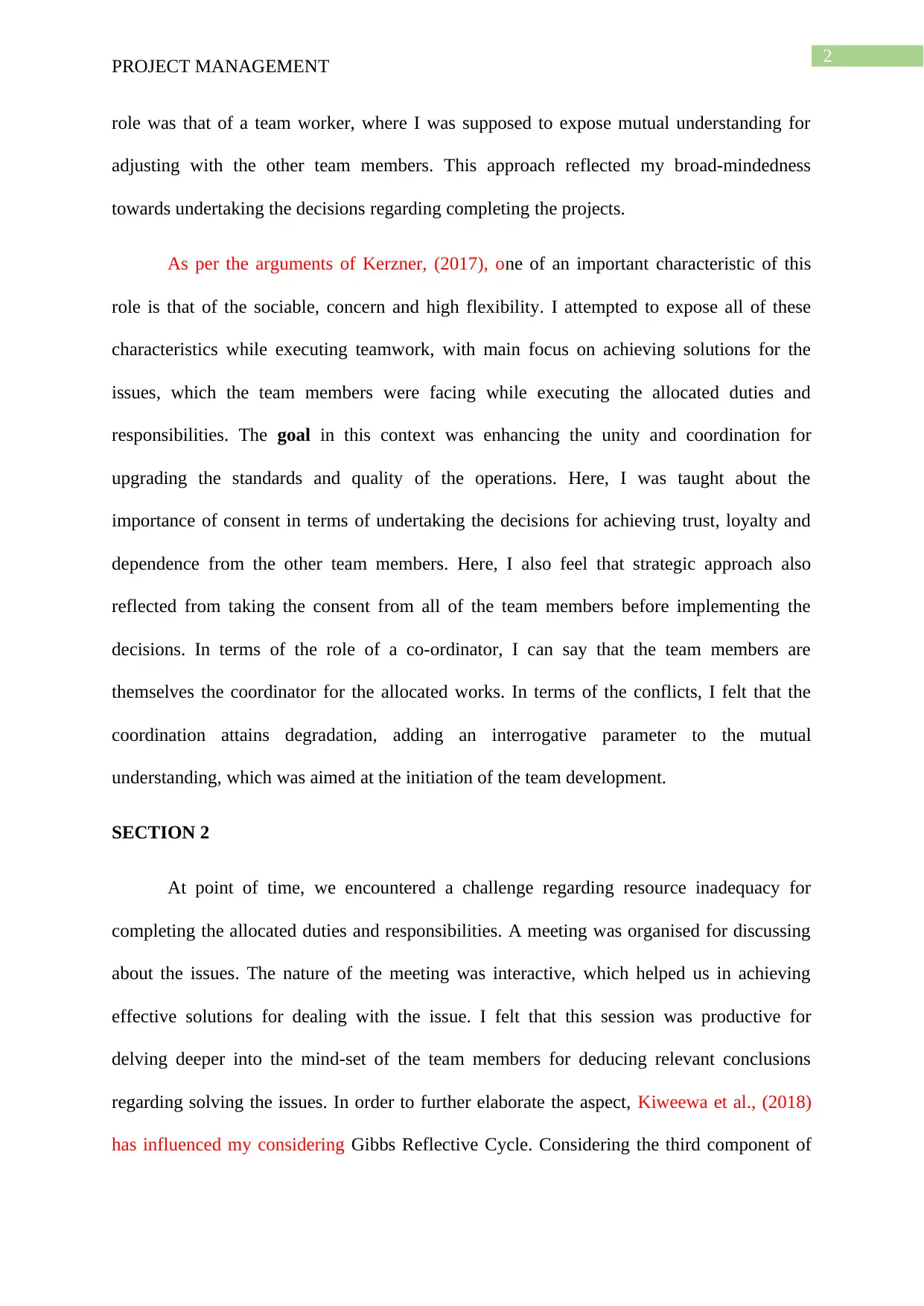
2
PROJECT MANAGEMENT
role was that of a team worker, where I was supposed to expose mutual understanding for
adjusting with the other team members. This approach reflected my broad-mindedness
towards undertaking the decisions regarding completing the projects.
As per the arguments of Kerzner, (2017), one of an important characteristic of this
role is that of the sociable, concern and high flexibility. I attempted to expose all of these
characteristics while executing teamwork, with main focus on achieving solutions for the
issues, which the team members were facing while executing the allocated duties and
responsibilities. The goal in this context was enhancing the unity and coordination for
upgrading the standards and quality of the operations. Here, I was taught about the
importance of consent in terms of undertaking the decisions for achieving trust, loyalty and
dependence from the other team members. Here, I also feel that strategic approach also
reflected from taking the consent from all of the team members before implementing the
decisions. In terms of the role of a co-ordinator, I can say that the team members are
themselves the coordinator for the allocated works. In terms of the conflicts, I felt that the
coordination attains degradation, adding an interrogative parameter to the mutual
understanding, which was aimed at the initiation of the team development.
SECTION 2
At point of time, we encountered a challenge regarding resource inadequacy for
completing the allocated duties and responsibilities. A meeting was organised for discussing
about the issues. The nature of the meeting was interactive, which helped us in achieving
effective solutions for dealing with the issue. I felt that this session was productive for
delving deeper into the mind-set of the team members for deducing relevant conclusions
regarding solving the issues. In order to further elaborate the aspect, Kiweewa et al., (2018)
has influenced my considering Gibbs Reflective Cycle. Considering the third component of
PROJECT MANAGEMENT
role was that of a team worker, where I was supposed to expose mutual understanding for
adjusting with the other team members. This approach reflected my broad-mindedness
towards undertaking the decisions regarding completing the projects.
As per the arguments of Kerzner, (2017), one of an important characteristic of this
role is that of the sociable, concern and high flexibility. I attempted to expose all of these
characteristics while executing teamwork, with main focus on achieving solutions for the
issues, which the team members were facing while executing the allocated duties and
responsibilities. The goal in this context was enhancing the unity and coordination for
upgrading the standards and quality of the operations. Here, I was taught about the
importance of consent in terms of undertaking the decisions for achieving trust, loyalty and
dependence from the other team members. Here, I also feel that strategic approach also
reflected from taking the consent from all of the team members before implementing the
decisions. In terms of the role of a co-ordinator, I can say that the team members are
themselves the coordinator for the allocated works. In terms of the conflicts, I felt that the
coordination attains degradation, adding an interrogative parameter to the mutual
understanding, which was aimed at the initiation of the team development.
SECTION 2
At point of time, we encountered a challenge regarding resource inadequacy for
completing the allocated duties and responsibilities. A meeting was organised for discussing
about the issues. The nature of the meeting was interactive, which helped us in achieving
effective solutions for dealing with the issue. I felt that this session was productive for
delving deeper into the mind-set of the team members for deducing relevant conclusions
regarding solving the issues. In order to further elaborate the aspect, Kiweewa et al., (2018)
has influenced my considering Gibbs Reflective Cycle. Considering the third component of
⊘ This is a preview!⊘
Do you want full access?
Subscribe today to unlock all pages.

Trusted by 1+ million students worldwide
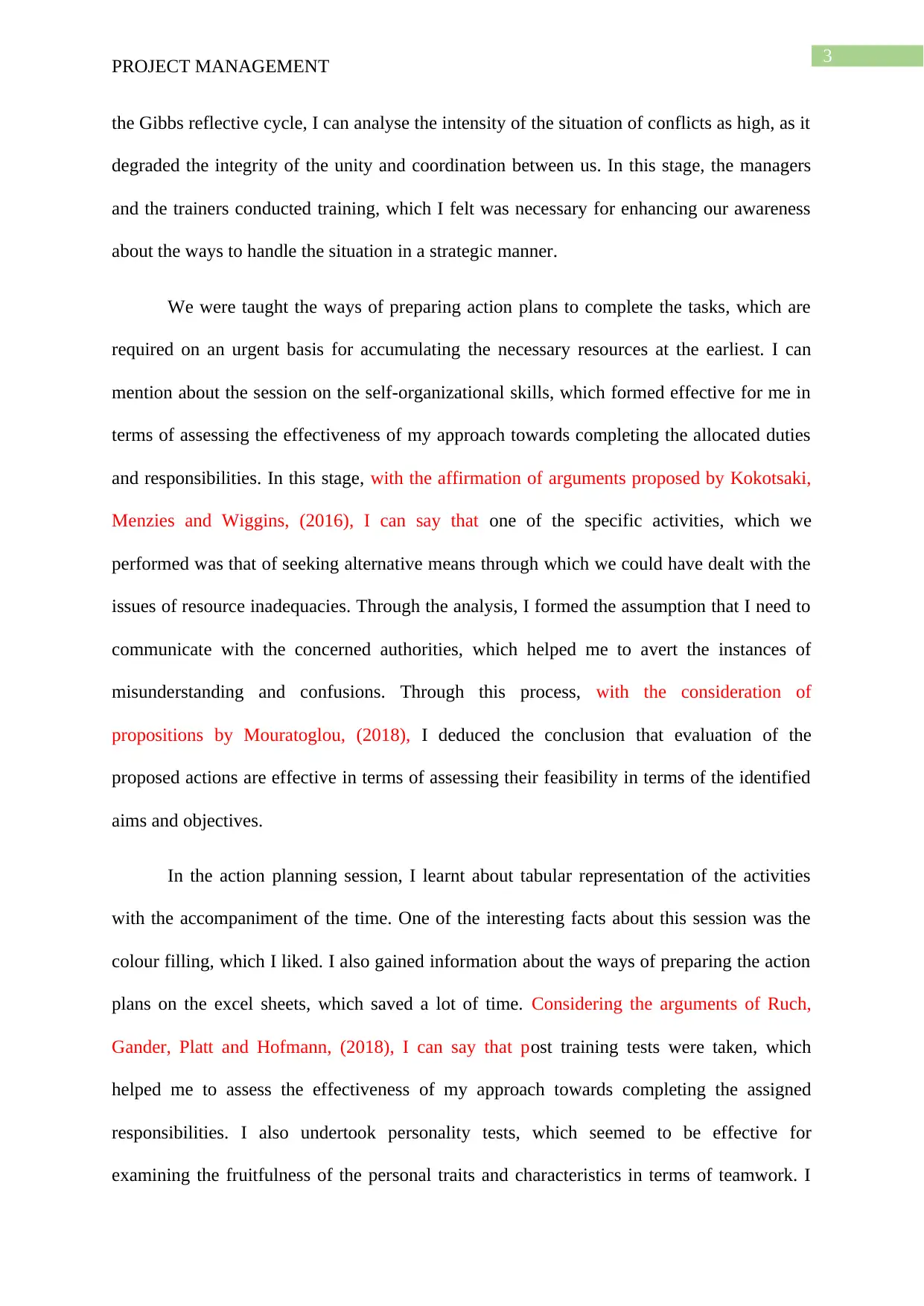
3
PROJECT MANAGEMENT
the Gibbs reflective cycle, I can analyse the intensity of the situation of conflicts as high, as it
degraded the integrity of the unity and coordination between us. In this stage, the managers
and the trainers conducted training, which I felt was necessary for enhancing our awareness
about the ways to handle the situation in a strategic manner.
We were taught the ways of preparing action plans to complete the tasks, which are
required on an urgent basis for accumulating the necessary resources at the earliest. I can
mention about the session on the self-organizational skills, which formed effective for me in
terms of assessing the effectiveness of my approach towards completing the allocated duties
and responsibilities. In this stage, with the affirmation of arguments proposed by Kokotsaki,
Menzies and Wiggins, (2016), I can say that one of the specific activities, which we
performed was that of seeking alternative means through which we could have dealt with the
issues of resource inadequacies. Through the analysis, I formed the assumption that I need to
communicate with the concerned authorities, which helped me to avert the instances of
misunderstanding and confusions. Through this process, with the consideration of
propositions by Mouratoglou, (2018), I deduced the conclusion that evaluation of the
proposed actions are effective in terms of assessing their feasibility in terms of the identified
aims and objectives.
In the action planning session, I learnt about tabular representation of the activities
with the accompaniment of the time. One of the interesting facts about this session was the
colour filling, which I liked. I also gained information about the ways of preparing the action
plans on the excel sheets, which saved a lot of time. Considering the arguments of Ruch,
Gander, Platt and Hofmann, (2018), I can say that post training tests were taken, which
helped me to assess the effectiveness of my approach towards completing the assigned
responsibilities. I also undertook personality tests, which seemed to be effective for
examining the fruitfulness of the personal traits and characteristics in terms of teamwork. I
PROJECT MANAGEMENT
the Gibbs reflective cycle, I can analyse the intensity of the situation of conflicts as high, as it
degraded the integrity of the unity and coordination between us. In this stage, the managers
and the trainers conducted training, which I felt was necessary for enhancing our awareness
about the ways to handle the situation in a strategic manner.
We were taught the ways of preparing action plans to complete the tasks, which are
required on an urgent basis for accumulating the necessary resources at the earliest. I can
mention about the session on the self-organizational skills, which formed effective for me in
terms of assessing the effectiveness of my approach towards completing the allocated duties
and responsibilities. In this stage, with the affirmation of arguments proposed by Kokotsaki,
Menzies and Wiggins, (2016), I can say that one of the specific activities, which we
performed was that of seeking alternative means through which we could have dealt with the
issues of resource inadequacies. Through the analysis, I formed the assumption that I need to
communicate with the concerned authorities, which helped me to avert the instances of
misunderstanding and confusions. Through this process, with the consideration of
propositions by Mouratoglou, (2018), I deduced the conclusion that evaluation of the
proposed actions are effective in terms of assessing their feasibility in terms of the identified
aims and objectives.
In the action planning session, I learnt about tabular representation of the activities
with the accompaniment of the time. One of the interesting facts about this session was the
colour filling, which I liked. I also gained information about the ways of preparing the action
plans on the excel sheets, which saved a lot of time. Considering the arguments of Ruch,
Gander, Platt and Hofmann, (2018), I can say that post training tests were taken, which
helped me to assess the effectiveness of my approach towards completing the assigned
responsibilities. I also undertook personality tests, which seemed to be effective for
examining the fruitfulness of the personal traits and characteristics in terms of teamwork. I
Paraphrase This Document
Need a fresh take? Get an instant paraphrase of this document with our AI Paraphraser
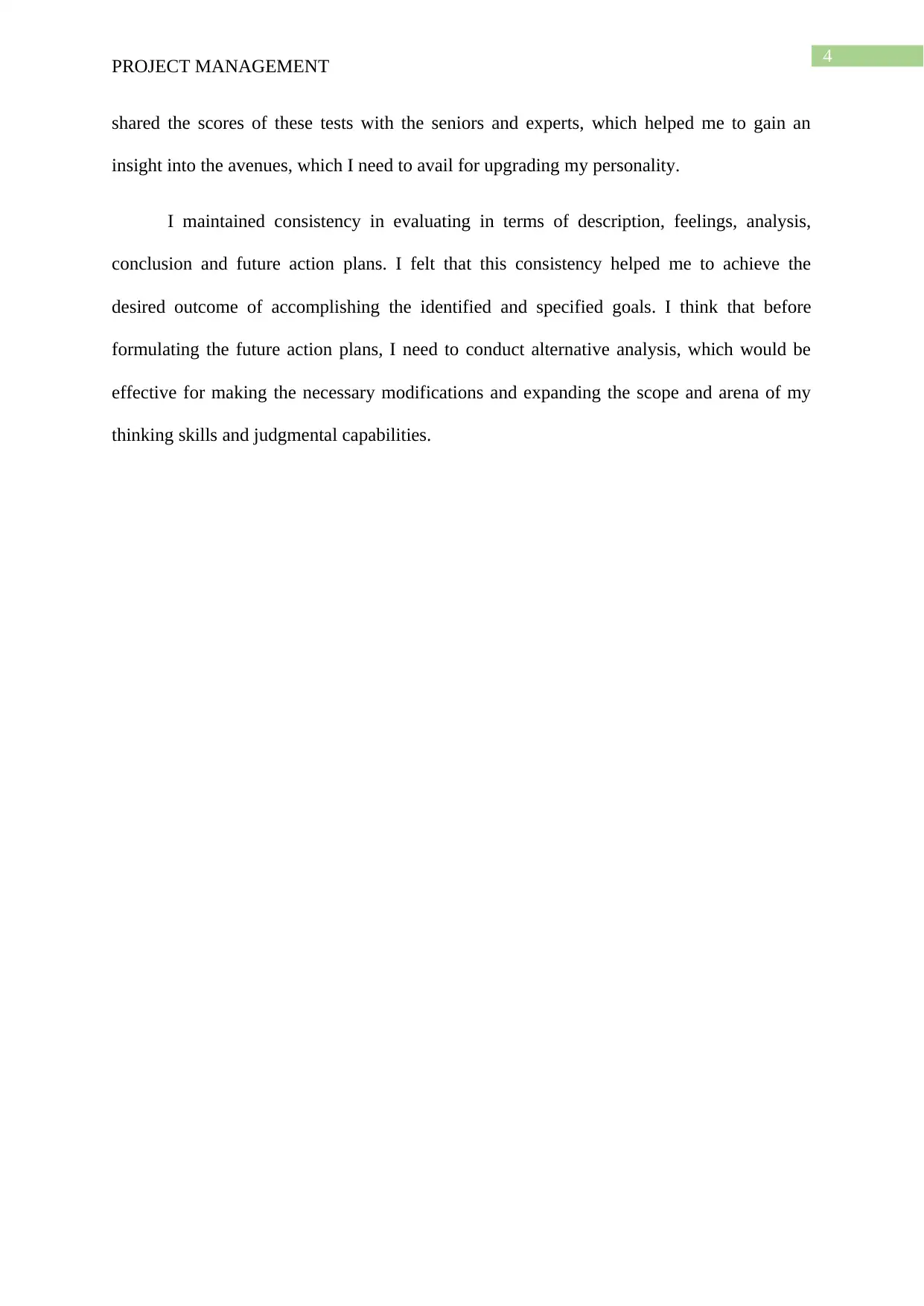
4
PROJECT MANAGEMENT
shared the scores of these tests with the seniors and experts, which helped me to gain an
insight into the avenues, which I need to avail for upgrading my personality.
I maintained consistency in evaluating in terms of description, feelings, analysis,
conclusion and future action plans. I felt that this consistency helped me to achieve the
desired outcome of accomplishing the identified and specified goals. I think that before
formulating the future action plans, I need to conduct alternative analysis, which would be
effective for making the necessary modifications and expanding the scope and arena of my
thinking skills and judgmental capabilities.
PROJECT MANAGEMENT
shared the scores of these tests with the seniors and experts, which helped me to gain an
insight into the avenues, which I need to avail for upgrading my personality.
I maintained consistency in evaluating in terms of description, feelings, analysis,
conclusion and future action plans. I felt that this consistency helped me to achieve the
desired outcome of accomplishing the identified and specified goals. I think that before
formulating the future action plans, I need to conduct alternative analysis, which would be
effective for making the necessary modifications and expanding the scope and arena of my
thinking skills and judgmental capabilities.
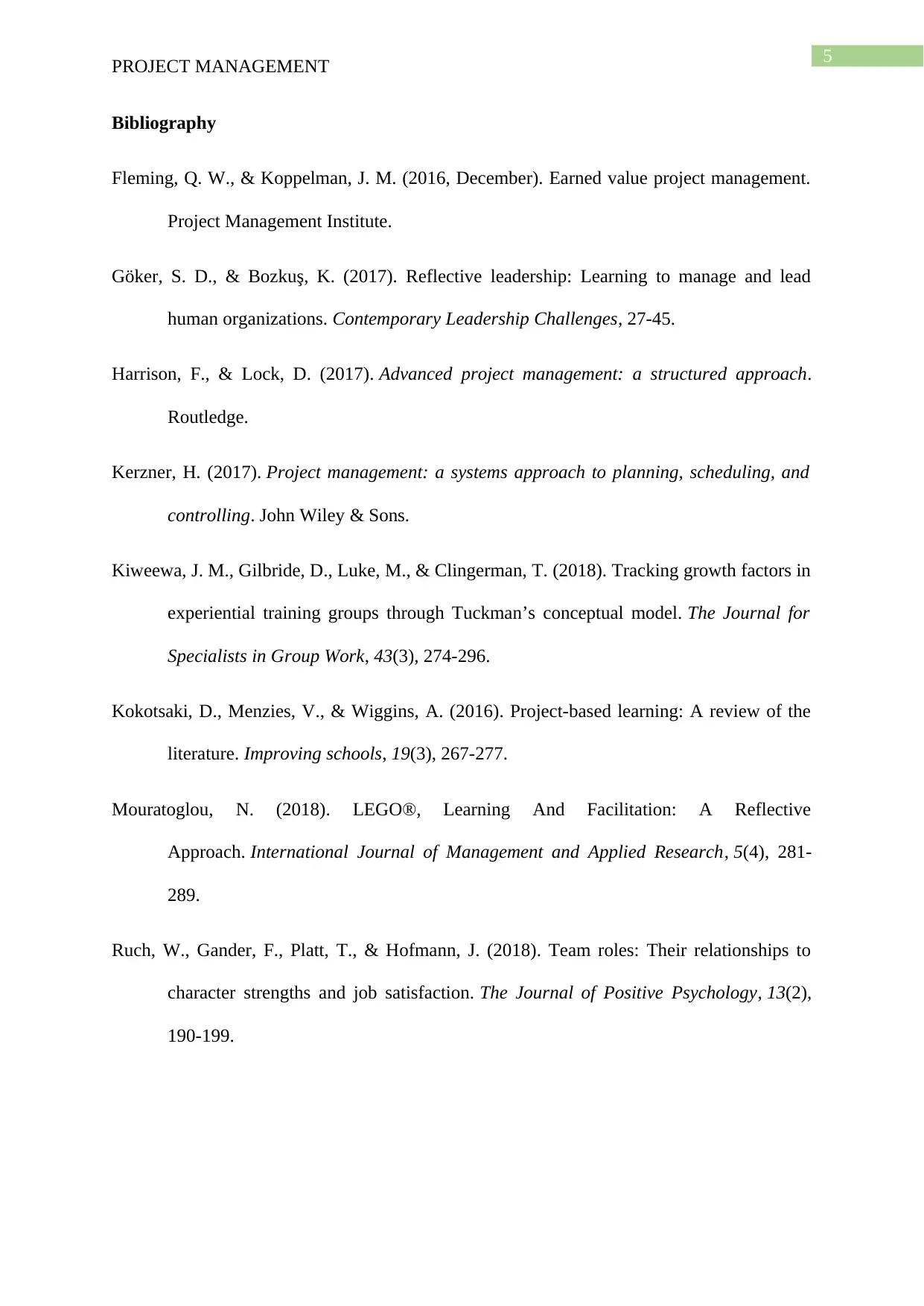
5
PROJECT MANAGEMENT
Bibliography
Fleming, Q. W., & Koppelman, J. M. (2016, December). Earned value project management.
Project Management Institute.
Göker, S. D., & Bozkuş, K. (2017). Reflective leadership: Learning to manage and lead
human organizations. Contemporary Leadership Challenges, 27-45.
Harrison, F., & Lock, D. (2017). Advanced project management: a structured approach.
Routledge.
Kerzner, H. (2017). Project management: a systems approach to planning, scheduling, and
controlling. John Wiley & Sons.
Kiweewa, J. M., Gilbride, D., Luke, M., & Clingerman, T. (2018). Tracking growth factors in
experiential training groups through Tuckman’s conceptual model. The Journal for
Specialists in Group Work, 43(3), 274-296.
Kokotsaki, D., Menzies, V., & Wiggins, A. (2016). Project-based learning: A review of the
literature. Improving schools, 19(3), 267-277.
Mouratoglou, N. (2018). LEGO®, Learning And Facilitation: A Reflective
Approach. International Journal of Management and Applied Research, 5(4), 281-
289.
Ruch, W., Gander, F., Platt, T., & Hofmann, J. (2018). Team roles: Their relationships to
character strengths and job satisfaction. The Journal of Positive Psychology, 13(2),
190-199.
PROJECT MANAGEMENT
Bibliography
Fleming, Q. W., & Koppelman, J. M. (2016, December). Earned value project management.
Project Management Institute.
Göker, S. D., & Bozkuş, K. (2017). Reflective leadership: Learning to manage and lead
human organizations. Contemporary Leadership Challenges, 27-45.
Harrison, F., & Lock, D. (2017). Advanced project management: a structured approach.
Routledge.
Kerzner, H. (2017). Project management: a systems approach to planning, scheduling, and
controlling. John Wiley & Sons.
Kiweewa, J. M., Gilbride, D., Luke, M., & Clingerman, T. (2018). Tracking growth factors in
experiential training groups through Tuckman’s conceptual model. The Journal for
Specialists in Group Work, 43(3), 274-296.
Kokotsaki, D., Menzies, V., & Wiggins, A. (2016). Project-based learning: A review of the
literature. Improving schools, 19(3), 267-277.
Mouratoglou, N. (2018). LEGO®, Learning And Facilitation: A Reflective
Approach. International Journal of Management and Applied Research, 5(4), 281-
289.
Ruch, W., Gander, F., Platt, T., & Hofmann, J. (2018). Team roles: Their relationships to
character strengths and job satisfaction. The Journal of Positive Psychology, 13(2),
190-199.
⊘ This is a preview!⊘
Do you want full access?
Subscribe today to unlock all pages.

Trusted by 1+ million students worldwide
1 out of 6
Related Documents
Your All-in-One AI-Powered Toolkit for Academic Success.
+13062052269
info@desklib.com
Available 24*7 on WhatsApp / Email
![[object Object]](/_next/static/media/star-bottom.7253800d.svg)
Unlock your academic potential
Copyright © 2020–2026 A2Z Services. All Rights Reserved. Developed and managed by ZUCOL.





